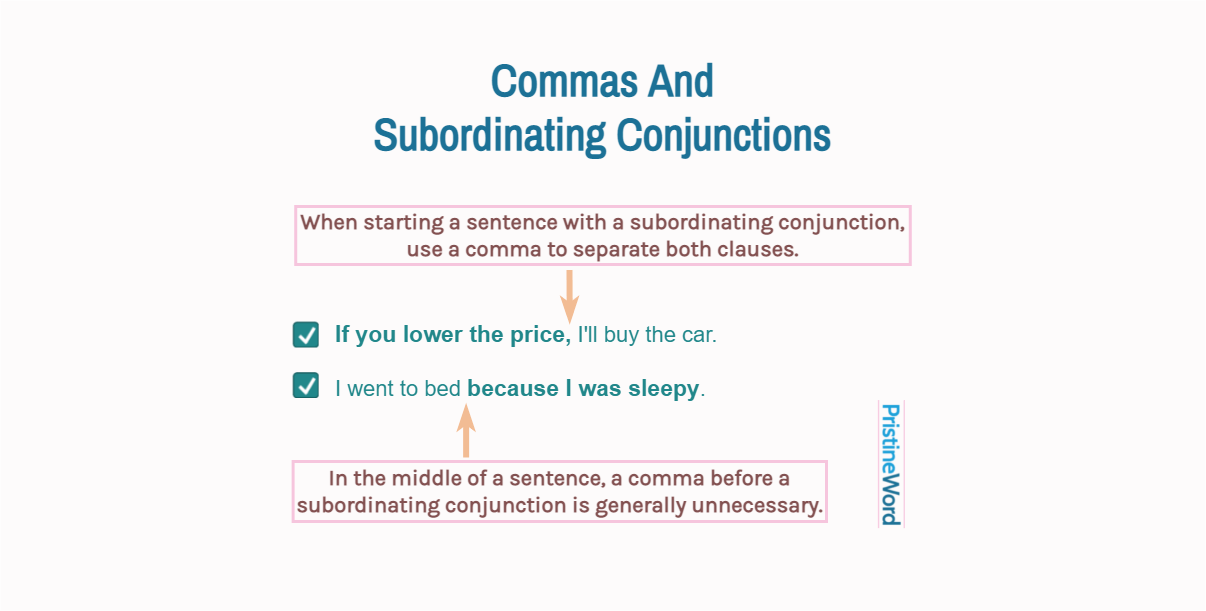When starting a sentence with a subordinating conjunction, use a comma to separate both clauses. In mid-sentence, the comma is unnecessary.
When starting a sentence with a subordinating conjunction, use a comma to separate both clauses.
Although I don't enjoy spicy food, I went to a Mexican restaurant yesterday.
Although I don't enjoy spicy food I went to a Mexican restaurant yesterday.
In the middle of a sentence, a comma before a subordinating conjunction is generally unnecessary.
We didn't play tennis because it was raining.
1. When to Use a Comma
A subordinating conjunction, such as "because", "if", "although", "when", etc., links an independent clause to a dependent clause.
I'll buy the car if you lower the price.
This sentence has two clauses:
- "I'll buy the car" is the main clause; it can stand alone and expresses a complete thought.
- "If you lower the price" is the dependent clause or adverbial clause; it has a subject and a verb, but does not express a complete thought.
A subordinating conjunction always comes before the dependent clause, but the dependent clause itself can precede or follow the main clause; thus, you can say:
Because I was sleepy, I went to bed.
I went to bed because I was sleepy.
Note that the comma is determined by the position of the dependent clause. If the dependent clause comes after the main clause, the comma is frequently unnecessary.
Olivia learned to play the piano when she was a child.
Why do we omit the comma? In the middle of a sentence, a subordinating conjunction creates a strong connection between two clauses. As a result, they should not be separated by a comma.
Stay here until I come back from the grocery store.
Stay here, until I come back from the grocery store.
However, when starting a sentence with an adverbial clause, add a comma after the first clause.
If Rebecca doesn't make an effort, she won't win.
If Rebecca doesn't make an effort she won't win.
This is a partial list of common subordinating conjunctions. You can follow their links to learn more about how to use commas with these words:
2. Exceptions
There are exceptions to this convention of not using a comma if the main clause comes first. For example, if there is a strong contrast between the two parts of a sentence, use a comma before a clause introduced by although, even though, though, or whereas.
My wife is very fat, whereas I am skinny.
You may also need a comma to add nonessential information or avoid confusion. For example:
I didn't go to Denver because my grandfather was sick.
Without further contextual information, we do not know whether:
- I had to stay because my grandfather was sick; therefore, I didn't go to Denver; or
- I actually went to Denver, but for a different reason (not because my grandfather was sick).
Place a comma before "because" to mean that you didn't go to Denver.
I didn't go to Denver, because my grandfather was sick.
3. More Examples
3.1 Comma
- Since Claire was hungry, she decided to eat a pizza.
- If you press that button, we'll go down.
- While I am a vegetarian, most of my friends love eating meat.
- Although I worked really hard on the project, I did not succeed.
- When Alice was a little girl, she used to play with her dolls.
3.2 No comma
- I cannot go to Chicago until my boss approves the project.
- I usually feel frustrated because my efforts are not rewarded.
- My uncle gave me money so that I could buy a new dress.
- Take advantage of her expertise while she is with us.

